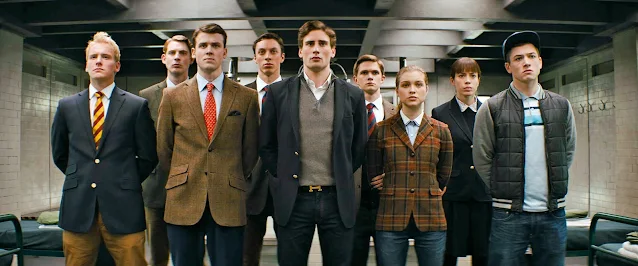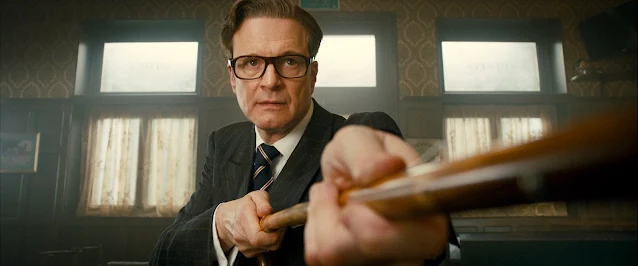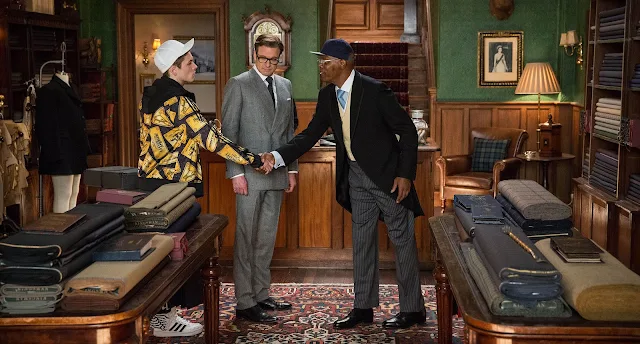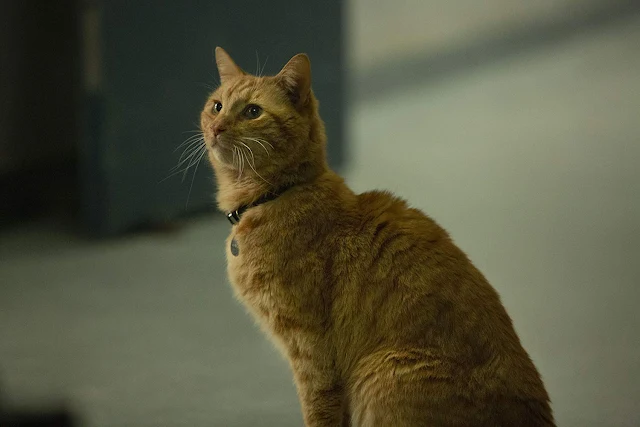A blog formerly known as Bookishness / By Charles Matthews
"Dazzled by so many and such marvelous inventions, the people of Macondo ... became indignant over the living images that the prosperous merchant Bruno Crespi projected in the theater with the lion-head ticket windows, for a character who had died and was buried in one film and for whose misfortune tears had been shed would reappear alive and transformed into an Arab in the next one. The audience, who had paid two cents apiece to share the difficulties of the actors, would not tolerate that outlandish fraud and they broke up the seats. The mayor, at the urging of Bruno Crespi, explained in a proclamation that the cinema was a machine of illusions that did not merit the emotional outbursts of the audience. With that discouraging explanation many ... decided not to return to the movies, considering that they already had too many troubles of their own to weep over the acted-out misfortunes of imaginary beings."--Gabriel García Márquez, One Hundred Years of Solitude
Search This Blog
Monday, February 10, 2025
Kingsman: The Secret Service (Matthew Vaughn, 2014)
Cast: Colin Firth, Taron Egerton, Mark Strong, Samuel L. Jackson, Sofia Boutella, Michael Caine, Fiona Hampton, Samantha Womack, Mark Hamill, Jack Davenport. Screenplay: Jane Goldman, Matthew Vaughn, based on a comic book by Mark Millar and Dave Gibbons. Cinematography: George Richmond. Production design: Paul Kirby. Film editing: Eddie Hamilton, John Harris. Music: Henry Jackman, Matthew Margeson.
Tuesday, October 3, 2023
Def by Temptation (James Bond III, 1990)
 |
| Cynthia Bond in Def by Temptation |
Def by Temptation overcomes its chief weaknesses -- a silly script and a miscast leading man -- to become good, gory fun, which shows how an ensemble working with the right director and producer can surmount even those obstacles. More to the point, the producer and director, James Bond III, overcomes his own weakness, because he's also the screenwriter and the leading man. The premise is that the devoutly religious Joel (Bond), who plans to become a "world-famous minister," puts himself in temptation's way by going to New York to see an old friend, known as "K" (Kadeem Hardison). K takes to a bar, where he falls for Temptation herself, a sultry seductress played with flair by Cynthia Bond, whom we see picking up men at the bar and bringing them to bloody ends. Realizing who and what she is, K joins forces with Dougy, a cop played by Bill Nunn, to rescue Joel, calling his grandmother (Minnie Gentry) to their aid. Hardison and Nunn bring the film to comic life, and they're aided by some very funny special effects, one of which involves a predatory television set surmounted by a caricature bust of Ronald Reagan. (Yeah, you have to see it to get it.) Unfortunately, there's also a lot of misplaced religiosity at work in Joel's battle with Temptation, and the R&B songs on the soundtrack sometimes don't work with what's on screen, so the movie goes tonally out of whack at times. It stays watchable even then, thanks to Ernest R. Dickerson's cinematography. Samuel L. Jackson has a small role in flashbacks as Joel's father, a minister in whose footsteps he hopes to follow.
Sunday, May 17, 2020
Spider-Man: Far From Home (Jon Watts, 2019)
 |
| Jake Gyllenhaal and Tom Holland in Spider-Man: Far From Home |
Andrew Garfield and Tobey Maguire are fine actors, but neither of them made the role of Spider-Man their own the way Tom Holland has done. His training as a dancer helped him get the moves right for the stunts as Spider-Man, and he's the right height (five-eight) and age (early 20s) to keep him credible as the adolescent Peter Parker. Beyond that, he's a gifted actor, more than holding his own in scenes with veterans like Samuel L. Jackson and Jake Gyllenhaal. It's hard to know what Marvel Studios will do when Holland eventually ages out of the role. He's the main reason I liked Spider-Man: Far From Home much more than the usual superhero movie. He makes the slam-bang special effects tolerable. It helps, too, that he's up against one of the more engaging villains in the genre, Gyllenhaal's Quentin Beck, aka Mysterio. Gyllenhaal -- who was once considered for the role of the webslinger in Spider-Man 2 (Sam Raimi, 2004) when Maguire was sidelined -- makes the seduction of Peter Parker into handing over the gizmo that gives him power credible, and then does a fine job of unveiling Beck's bad side. But mostly it's Holland's ability to sustain Peter's boyish gullibility, and his reluctance to give up his teenage life (and his pursuit of Zendaya's MJ) to become one of the Avengers, that brings the implausible superhero to life. The screenplay is efficient and sometimes witty, often at the expense of Peter, who gushes "Oh, I love Led Zeppelin!" when Happy Hogan (Jon Favreau) plays a track by AC/DC and who gets zinged by Nick Fury (Jackson) with "Uneasy lies the head that wears the crown. Stark said you wouldn't get that because it's not a Star Wars reference."
Thursday, December 26, 2019
Captain Marvel (Anna Boden, Ryan Fleck, 2019)
Captain Marvel (Anna Boden, Ryan Fleck, 2019)
Cast: Brie Larson, Samuel L. Jackson, Ben Mendelsohn, Jude Law, Annette Bening, Djimon Hounsou, Lee Pace, Lashana Lynch, Gemma Chan, Clark Gregg, Akira Akbar. Screenplay: Anna Boden, Ryan Fleck, Geneva Robertson-Dworet, Nicole Perlman, Meg LeFauve. Cinematography: Ben Davis. Production design: Andy Nicholson. Film editing: Debbie Berman, Elliot Graham. Music: Pinar Toprak.
When I was a kid, Captain Marvel was a big guy in red long-johns and a cape who looked like a swole Fred MacMurray. But now, many years and many lawsuits later, the captain is a woman and my erstwhile superhero has taken on the name Shazam! which was the magic word that Billy Batson used to transform himself. And that's another movie -- not to mention another comics universe -- entirely, one that I hope I hope to see before too long. Captain Marvel the movie is about Carol Danvers and the origin story of her superhero alter ego. Or perhaps I should say one of the origin stories, because if you start rambling around the internet you'll find that the mighty captain has had many personae along the way. Even this origin story is a little head-spinning, involving rival alien races, abduction, amnesia, accidentally acquired superpowers, and much more. Even now, I'm not sure I can tell you for certain whether the Kree and the Skrull are the bad guys or the good guys and where Annette Bening's Dr. Lawson fits into the whole thing. Only my familiarity with Nick Fury and Phil Coulson (Samuel F. Jackson and Clark Gregg, respectively) from other Marvel movies and TV shows makes me think that Carol Danvers is doing the right thing by trusting them. Even my favorite character in the movie, Goose, is a somewhat ambiguous figure, apt to turn into a voracious many-headed monster when provoked. Good kitty. I have long since grown impatient with movies in which the credits run almost as long as the story, so the narrative complexity of Captain Marvel bored me less than the usual CGI foofaraw it sets up. Brie Larson does what she can with a character who, if she's really as invulnerable as the film implies, doesn't hold much chance for challenge and growth. I assume the sequels will show us what her Kryptonite is -- she can't just potter around the universe tidying things up forever.
Tuesday, January 31, 2017
The Hateful Eight (Quentin Tarantino, 2015)
Tuesday, August 2, 2016
Jackie Brown (Quentin Tarantino, 1997)
 |
| Pam Grier and Robert Forster in Jackie Brown |
Saturday, April 9, 2016
Pulp Fiction (Quentin Tarantino, 1994)
 |
| Uma Thurman and John Travolta in Pulp Fiction |
Honey Bunny: Amanda Plummer
Vincent Vega: John Travolta
Jules Winnfield: Samuel L. Jackson
Butch Coolidge: Bruce Willis
Marsellus Wallace: Ving Rhames
Mia Wallace: Uma Thurman
Capt. Koons: Christopher Walken
Fabienne: Maria de Medeiros
Winston Wolfe: Harvey Keitel
Brett: Frank Whaley
Jody: Rosanna Arquette
Lance: Eric Stoltz
Director: Quentin Tarantino
Screenplay: Quentin Tarantino, Roger Avary
Cinematography: Andrzej Sekula
Production design: David Wasco
Film editing: Sally Menke
Watching Pulp Fiction again -- I don't know how many times I've seen it but it feels like a lot -- I'm struck by how much the film is about language. In a way that's appropriate, given that it was nominated for seven Oscars but won only for the screenplay by Tarantino and Roger Avary. And certainly language comes to the fore in the way the film tramples on taboos like the f-word and the n-word, which are repeated so often that you're numbed to the expected shock. And then there's the great biblical tirade by Jules, extrapolated from a passage in Ezekiel and repeated three times to make sure we get the point that Jules is some kind of prophet. And of course there's the familiar pronouncement by Vincent that the French call a quarter-pounder with cheese a Royale with cheese. But throughout the film characters encounter semantic problems, as when Jules asks Brett what country he's from. The puzzled Brett asks, "What?" thereby provoking Jules's response, "'What' ain't no country I've ever heard of. They speak English in What?" Or when Esmeralda (Angela Jones) asks Butch what his name means, and Butch replies, "I'm American, honey. Our names don't mean shit." Or when Pumpkin calls out, "Garçon! Coffee!" and the waitress (Laura Lovelace) corrects him: "'Garçon' means boy." Pumpkin and Honey Bunny have even decided to give up robbing liquor stores because they're owned by "too many foreigners [who] don't speak fucking English." For Pulp Fiction's characters language is a means of establishing dominance, as when Winston Wolfe refuses Vincent's request to say "please" when he's giving orders. It's also a way of establishing intimacy: When Vincent brings Mia home after she has overdosed, she finally tells him the silly joke -- a pun on catch up/ketchup -- that she refused to tell him earlier. So maybe Pulp Fiction isn't exactly about language -- it's also about violence and God and a lot of other things -- but I don't know of many other recent films that are so memorable because of it.





.jpeg)

















